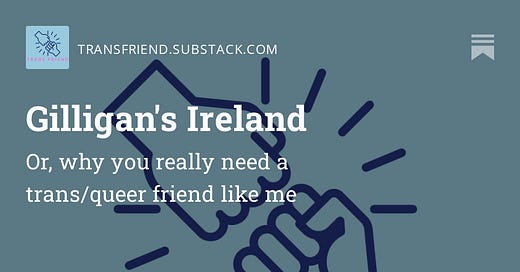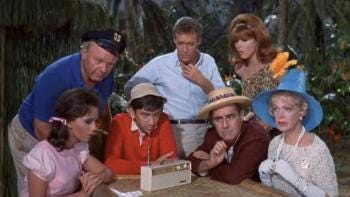“We’re going to my parents’ house,” says the woman who would eventually be my wife, co-parent, and ice cream consuming partner in crime. We’ve been together for close to two decades, but in those early moments of our relationship, some things made me nervous. Meeting the parents was at the top of that list.
Full disclosure, I’m a fair bit older than she is, and she was very young when we met. Also I’m American and she is Irish. Meeting her parents was part of a visit I made while she was still in college in Dublin. The ride from Dublin out to the farms and fields was picturesque, but my anxiety increased steadily with each passing kilometer.
Would they hate me the moment I walked in the door? Were they expecting a funny American accent? What did they know about me? Who were they envisioning?
“Oh,” she casually mentions about five minutes from our destination, “they’ve never met any of my other girlfriends.”
Is five minutes even enough time to dedicate to a panic attack or emotional spiral? It was barely enough time to break out in a cold sweat let alone predict the range of ‘ways things can go tragically wrong.’ And I had no control over the traffic lights, the road speeding under us, the crunch of gravel underfoot as we walked boldly up to the back door to the house.
As with so many of my memories, this one involves me pre-transition, expressing myself as female, which is why I refer to myself as my wife’s girlfriend. It’s worth noting that we would likely never have met, and almost certainly never fallen in love, had I presented my gender as masculine or nonbinary in the way that I now can, which is why I hold on dearly to these memories of my past self and my expression in those moments. Not all trans people feel comfortable reliving or describing points in their lives in this manner. For me, it is affirming of my journey to where I now stand, and I wouldn’t have it any other way.
My wife’s entire family lives in Ireland, so visiting them isn’t like driving to a nearby town in a rental car with the ability to bail if things look scary. And the feeling of being a foreigner in a country where you are not a native heightens all sense of anxiety by a factor of ten. I’m grateful that English is a primary language in Ireland, but for those of you who have been fortunate enough to travel far and wide, accents can make even your own language difficult to understand. Add in different turns of phrase or cultural references and you have a recipe for a lot of polite nodding and smiling without actually responding.
Back at the house, I was greeted by my girlfriend’s mother, the dogs, her younger sister. Things were awkward, but I was welcomed warmly, and it was a tremendous relief. I don’t recall much else until we all sat down for a dinner prepared by my now-mother-in-law. My plate was piled high with delicious food prepared by an experienced hand, and, though I struggled to make out the conversation with the fast pace and accent that comes with living in that part of Ireland, I was included in everything. They worked hard to get to know me, to teach me about their family and bring me into the fold with them.
I was the one who screwed that up.
Honestly, I don’t know how it even came up, but something that was said made me feel incredibly excited to share everything I knew about Gilligan’s Island. “Exactly! Like Ginger and Mary Ann and the Skipper! Oh, and the Professor!” Insert singing, “Just sit right back and you’ll hear a tale, a tale of a fateful trip…” By the time I got to the line about the three hour tour [the three hour tour] I had a table of five very polite Irish people staring at me like I was the most moronic person they’d ever let into their house. Nobody knew what to do with me. It was embarrassing as hell, but it’s an important part of the overall confession.
I grew up in the Midwest watching episodes of Gilligan’s Island. My big brother and I consumed a steady diet of reruns from M*A*S*H to The Incredible Hulk to Wonder Woman (Lynda Carter will forever be my first crush), and over time they’d become ingrained in the language and culture of my generation. But it turns out many of those shows are an American phenomenon, and people in Ireland were not exposed to Gilligan and the Skipper. They literally had no idea what the hell I was talking about. But damn, I was animated and lively, I sang >the entire theme song< while they stared on in (horrified) silence, and I’m sure I drove home whatever important point it had all been about. When I commit to being awkward, I go whole hog.
See, the thing about meeting people is that you can’t ignore their dimensionality. And I have a lot of that. I’m funny. I regularly make people snort-laugh, and it only encourages me to do it more often. I’m also charming, and I know it. Why shouldn’t I turn on the magic when meeting my future in-laws? Doesn’t everyone want to impress in that first meeting?
There’s a bigger side effect to this whole story that I’d like to point out. My wife’s family had never met anyone else who was queer apart from their own kid. It had been a struggle for them to accept and understand her. They knew I was coming for a visit, and I’m sure they were nervous and apprehensive. They had no idea who I’d turn out to be. When I walked in the door, I was a person. I had a name and a face and a personality. I blew away their preconceived ideas about queer people, and I replaced them with my humanness in all of its messy and imperfect glory. And I did it by making them laugh.
I’m not entirely sure how my wife’s family views the majority of queer people now that I’ve been part of their lives for so long, but they have never been anything less than utterly amazing in their support of us. They came and partied at our wedding, they have celebrated the birth and growing up of our children, and they have stood by our side throughout my transition. They are my family as much as my wife’s, and I love them dearly.
Hatred is the kind of thing that flourishes in the dark, in an underfed state of isolation. The less we know, the easier it is to fear and push it away. I’ve found this to be the case over and over again with my queerness. “Gosh, I didn’t know gays could be so normal,” has been said to me in several variations by many different people. I have made it a point in every aspect of my life to say things out loud that purposefully out me, such as using the term “my wife” (when I presented as female) in public settings, or highlighting that queer marriages typically involve stupid arguments, just like hetero marriages do. Being transgender hasn’t changed that narrative for me. My wife and I still glare at each other over the pile of dirty dishes, we roll our eyes when our kids whine about brushing their teeth, and she mocks me (quite fairly) for ignoring the assembly instructions in the box. Every. Single. Time. But we also share the sleeve of Oreo cookies at the beach on vacations. Sometimes she laughs at my dad jokes. And whether my kids called me Mama or Papi, they still argue about the need to brush their teeth.
Get to know a queer person. Get to know someone who is transgender. Talk to nonbinary people. And when you do, try hard to listen. Put yourself in our shoes. Stare hard at the signs delineating restrooms, pants on one side, skirts on the other, and ask yourself how it would feel not to know which one you should choose. Which one might bring you relief without anxiety? Which one will be safest?
Listen to our jokes. For real, we’re hilarious. Nobody knows how to laugh like oppressed populations.
Read our books.
Watch our films.
Interact with our art.
Listen to our music.
Watch our kids play.
Be our friends.
Sincerely,
Your trans/queer bestie, Robin
P.S. – Have you ever had an awkward moment meeting someone important? Tell me about it in the comments, or send me an email.






I’ve always found humor to help me in stressful /new situations. Being the token gay at work, I find myself always reminding my co workers that we are more similar than different in our home lives. My wife and I also fight over dishes. Lol.
Love the read. ❤️
Beautiful. Thank you.